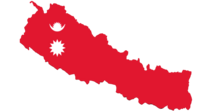Modanath Prasrit
 From Wikipedia the free encyclopedia
From Wikipedia the free encyclopedia
Modanath Prasrit | |
|---|---|
| मोदनाथ प्रश्रित | |
 Modanath Prasrit | |
| Born | Modanath Paudel 20 June 1942 |
| Nationality | Nepali |
| Education | Master's Degree (Nepali), Acharya (Ayurveda) |
| Occupation(s) | writer, poet, politician, political activist, social commentator, cultural commentator, Ayurvedic Practitioner |
| Parents |
|
| Awards | Madan Puraskar, 2023 B.S. Ujjwal Kirtimaya Rashtradeep (second class) |
| Writing career | |
| Nickname | Prasrit |
| Notable works | Maanav (Long Poem) Aamaka Aansu (Collection of poems) Devasur Sangram (Epic) Golagharko Sandesh (Long poem) |
| Member of Parliament[1] | |
| In office 1994–1999 | |
| Constituency | Rupandehi Area 3 |
| Minister of Education | |
| In office 2054 BS – 2055 BS | |
| Monarch | Birendra |
| Prime Minister | Man Mohan Adhikari |
| Personal details | |
| Political party | Nepal Communist Party |
| Other political affiliations | CPN-UML (until 2018) Nepali Congress(until 2019 BS) |
Modanath Prasrit, also Modnath Prasrit (Nepali: मोदनाथ प्रश्रित; born 20 June 1942)[1] is a Nepali writer, politician and political activist. A long time member of the Nepali communist movement,[1] he became the Minister of Education[1] in 2054 BS (A.D. none). His writings reflect his communist ideology. His book Devasur Sangram (Translation: War between Gods and Demons) is particularly noted for its challenge to Hindu orthodoxy.
Biography
[edit]Prasrit was born Modanath Paudel on 20 June 1942, in Khidim, Arghakhanchi, to Ghanashyam Paudel and Balikadevi.[1] He has Master's degree in Nepali language and a title of 'Acharya' in Ayurvedic Medicine.[1] He was awarded the Madan Puraskar for Nepali literature in 2023 B.S. (1966–67 A.D.) for the epic Maanav. He has continued to publish a prolific list of works in literature and socio-political commentary since then. Prasrit was an important intellectual figure in the Nepali struggle for Democracy during the Panchayat rule.
Political views
[edit]Modanath Prasrit is generally considered a "progressive" writer, although some within the movement claim he has joined the "reactionary" camp in recent years.[2] He has surprised many with his stance for reinstating Nepal as a Hindu nation, reverting secularism,[3] while also opining that there was no justification for a Hindu state in the first place.[4] He has also shown a soft spot for traditional Hindu poets like Bhanubhakta Acharya[5]
List of works
[edit]He has published a total of 2 epic poems, 2 long poems and 235 poems and songs in total. In addition, he regularly contributes his social, cultural and political commentary on newspapers, magazines, talk shows and conferences.[1]
| Type | Year (BS) | Title |
|---|---|---|
| Collection of poems | 2019 | Aamaka Aansu[1] |
| Long poem | 2020 | Buba khai?[1] |
| Long poem | 2023 | Maanav[1] |
| Epic | 2030 | Devasur Sangram[1] |
| Long poem | 2039 | Golagharko Sandesh[1] |
| Collection of poems | 2039 | Sahidko Ragat[1] |
| Collection of songs | 2049 | Jaba chalchha huri[1] |
| Collection of songs and poems | 2058 | Sankalit Rachana[1] |
Awards
[edit]In 2014, he was awarded the Ujjwal Kirtimaya Rashtradeep (second class), a national honour, by a cabinet decision, for his contributions to society.[6]
References
[edit]- ^ a b c d e f g h i j k l m n o "मोदनाथ प्रश्रित : कवि–व्यक्तित्व एवम् कृतित्व एक विश्लेषण" [Modanath Prasrit: Poet-Personality and writings, an analysis]. Samakalin Sahitya (in Nepali).. Retrieved 30 March 2019
- ^ Chalise, Prastut. "The Career of Bhanubhakta as a History of Nepali National Culture, 1940–1999." Studies in Nepali History and Society (1999): n. pag. Print.
- ^ Pramod Mishra Not caste in stone – OpEd Archived 30 March 2019 at the Wayback Machine, The Kathmandu Post. Retrieved 30 March 2019
- ^ NEPAL RELIGION: The Death Of Vishnu https://www.nchro.org/index.php/2006/05/28/nepal-religion-the-death-of-vishnu/ Archived 30 March 2019 at the Wayback Machine Retrieved 30 March 2019
- ^ Prasrit, Modnath. 2056 v.s. Bh¯anubhakta: Jant¯ak¯a l¯agi Avis¯ap ya Bard¯an? Uts¯aha 55: 49–56
- ^ "Late GP Koirala given highest national honour". The Kathmandu Post. 29 May 2014. Archived from the original on 14 December 2019. Retrieved 12 December 2019.
